Travel often gives us a unique perspective on things. The longer you spend in an area, especially if you’re mingling with locals, the more that perspective grows.
Morocco has given me some unique perspectives.
I never voiced this to anyone, but I was a bit nervous coming here. Not just because of the language limitations. While I have friends and connections who are Muslim, I’ve never been to a mostly Muslim area before. Yes, in the States all you really get exposed to is the uglier side of the fanatic, extreme side of Islam, but that didn’t bother me. I knew that stuff wasn’t representative of the whole Muslim culture. What bothered me was how I would be received as an American. Particularly in light of some of the things going on in the Middle East.
I came prepared to tell people I was from Canada. Not because of any shame of being from the States, but because I wanted to be given a chance. The first time I told someone we were from the States, they were quite surprised. “We don’t get many Americans here! So tell me, what do you think of this Romney character.”
What?
While our train departed from the station, I engaged in a fascinating political discussion with an older Moroccan male. He felt Romney was “all about money” and gave me reasons why he believed that. He brought up other things and proved he was actually more informed about things in my native country than many of my fellow citizens. He hoped for an Obama win, so I’m sure he was happy when he heard the news a couple of weeks later.
While most Moroccans are of Berber origin, the culture is quite Arabic. I knew the Middle Eastern culture was very hospitable, but I was still surprised by the overall warmth and friendliness of the people, even when they weren’t trying to sell me something.
Most Moroccans live a very humble life. In rural areas, the average person earns about $428 per month. That means that purchasing 1 kg of camel is 3% of their monthly wage.
When we eat breakfast at our favorite joint we always order kulshi (meaning, literally, “all”). We’ll split 3 eggs, a basket of breads, a dish of argon butter (kind of like almond butter), a pot of tea, and 2 large mugs of fresh-squeezed orange juice. We pay 37 MAD, or $4.40, for this breakfast. That is almost 1/3 of a person’s average daily wage, and we are getting charged the locals price. Our 3G Internet service costs just $24 a month per person. A kilo of produce is around 15 MAD ($1.78).
In the States, our current extremely modest income places our 2-person household well below the poverty line. Here we spend about the same as what a Moroccan earns each month, but we also aren’t paying for electricity or rent, and it’s for 1 adult and 1 child, whereas as most Moroccan families we’ve seen have at least 5 people. That doesn’t include the good chance that they are also supporting the husband’s mother and father, and it is highly likely that neither of them are bringing in an income either.
I was recently quite touched when a man who had been walking from table to table begging for a cup of tea saw Tigger. He came over and handed him a dirham (about 8.5 cents), smiled, and walked away. Later while taking the shared taxi home, a lady took out a small, plastic toy elephant from her purse and handed it to my son to play with. He tried to give it back to her as we were leaving the cab, but she wouldn’t hear of it.
In addition to being challenged by life here, I’ve been humbled by the generosity of people much poorer than ourselves. I have to fight against politely refusing gifts such as when our nearly toothless vegetable vendor hands us 2 oranges for free. To refuse a gift would offer a painful insult. To counter with money or another gift could very well be another form of insult.
Today was my final grocery trip into town. I found myself getting emotional as I let people know we were leaving, especially when Ibrahim, our favorite fruit vendor, asked for my address so we could keep in touch. Tigger had slept in and decided he’d rather not join me for the journey. Every person we knew asked after him.
This is the part of slow travel that is the most magical and the most painful. We’ve gotten to know people, build small relationships, and in a way become part of the community. And in 3 days we leave for the next destination. I definitely am not the same man who almost didn’t cross the border nearly three months ago. This country has left an indelible mark on me.
We haven’t left yet, but my heart already aches for Morocco, most especially for Guelmim and our little oasis of Tighmert.

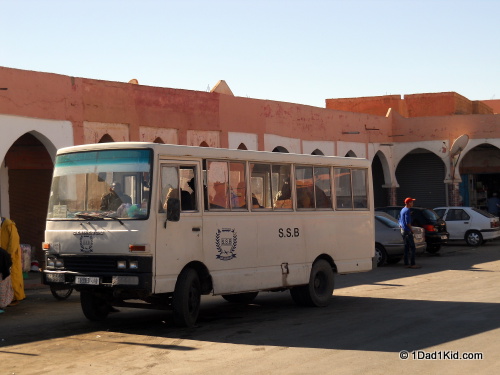
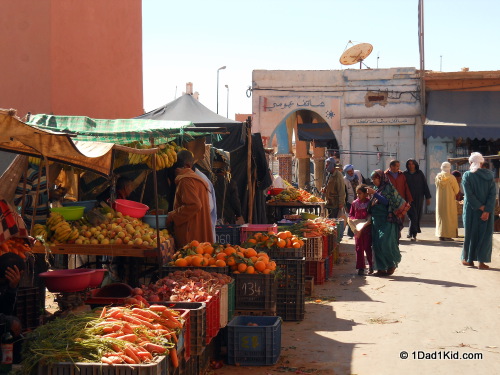
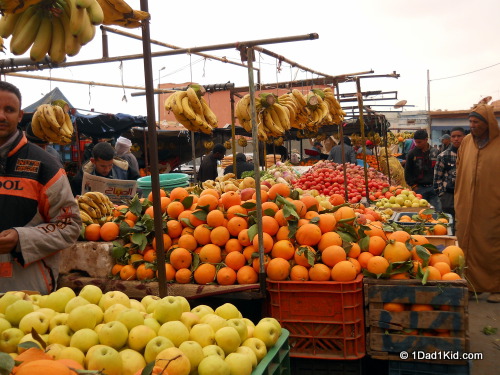
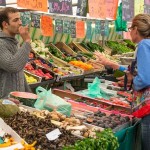
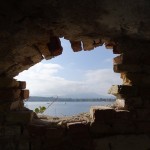
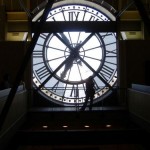

January 15, 2013
Talon, you’ve fallen in love with the people and their society…that’s what is so special about your posts from Morocco! Thank you for teaching your readers about the wonderful nature of this part of the world. I am curious to see how your tone and words will help you to share your observations with us in other parts of the world. Continued safe travels for you and Tigger, and Bon Voyage!
January 15, 2013
Considering how wonderful the world is, I look forward to being able to write many more posts like this one. Not sure France will be the source for the next one, but we shall see. I foresee some culture shock as we return to a developed nation after 3 months in Morocco. Shall be interesting! 🙂
January 14, 2013
You made me feel happy and sad at the same time – which means your writing did its job :=) Really interesting to read your thoughts and opinions because with the best will in the world we will be able to travel to everywhere, so it’s marvelous to get an insight like yours.
January 14, 2013
Thanks, Linda. It was very mixed emotions as we left the oasis today. Tomorrow will be weird as well as we finally leave the country.
January 14, 2013
That is a really great article. I would really love to travel to Morocco now.
January 14, 2013
Thanks! You really should. As far as I’m concerned, it’s a must-see destination.
January 12, 2013
We could learn a LOT from other cultures for sure.
January 12, 2013
“Pay-it-forward”. Westerners like giving money to “organizations”. They count this as generosity, and it is. Muslim countries are often seen by the West from afar as not being very giving, since internet statistics don’t show much giving (to organizations).
I imagine it would seem odd to them to give back a toy or coin. It’s expected that you would pay-it-forward. A westerner might see it as a poor person giving away what little they have, but from their perspective what goes around comes around and they aren’t actually losing what they give away.
We could learn something.
Some of the USA’s issues with the native peoples hundreds of years ago were friction from European-descendents wanting to take sole possession of stuff. Native peoples tended more towards a person having primary possession, not necessarily exclusive possession. “Stuff” rotated ownership as the situation evolved, migrating through the seasons. They often “stole” but stealing wasn’t as bad to them as it was to westerners who believed in complete ownership.
Possessions can own you, if you let them.
This guy says it better…
http://clivesimpkins.blogs.com/clive_simpkins/2010/09/pay-it-forward.html
January 12, 2013
That was so beautiful… I got all emotional reading it, thinking about all the bonds I’ve formed and people I’ve left. But then I’m also thinking about the people I have returned to, and will return to, and the ones I haven’t even met yet. It’s all part of the beauty that is travelling. I truly love your writing, this piece holds so many thoughts and emotions that I find in my own heart. Thank you. And look to the next round of beautiful encounters with this world.
January 12, 2013
Thanks, Mariella! Travel is such an amazing thing.
January 12, 2013
Yes, that’s the downside to slow travel. I was in Morocco only a few weeks, and it fondly remains one of my most favorite countries.
Here in Vietnam now for more than a year… I can’t imagine how sad it would be to leave it. Not planning on doing that anytime soon though, as I’m finding that I’m able to explore the many wondrous neighboring lands here in SEA, and love having Vietnam (and especially dear, coool, greeeen Dalat) to call “home”.
January 12, 2013
It’s so interesting how a place can grab onto you. We were in Honduras for 8 months. Loved it, but it wasn’t painful to leave. Morocco is quite another story for me.
January 12, 2013
Oh my heart. I know this feeling well. ((Hug))
January 12, 2013
It’s a good problem to have, though, no?
January 12, 2013
Oh Talon,
Beautifully written as always, made me teary actually! While we are so excited to be headed off around Australia living as nomads, I can’t wait to explore all the corners of this country. However part of me, reading the stories of wonderful bloggers such as yourself is excited about entertaining the idea of venturing out into the wide, wide, world one day too. I would be lying if I said that the idea of it didn’t make me nervous as anything, and like you’ve admitted here, I’ll admit that many parts of the world seem so scary to me, in comparison to being based in relatively “safe” Australia. That’s why your blogging is so important, so that I, and others can find comfort and knowledge in the beauty of world travel and hopefully one day embark on our own overseas journey too!
January 12, 2013
One thing we’ve seen time and time again: The world is a wonderful place filled with wonderful people. Every place has its stinkers and not every place is great for everyone, but it’s an amazing world we live in. I look forward to you experiencing more of it!
January 11, 2013
It’s quite often observed that people in poor third world countries show more generosity than their better off counterparts..
January 12, 2013
So very true!
January 11, 2013
What a touching piece of writing…….I love it and hope when we begin out travels we will experience life as you do. X
January 11, 2013
I’m sure you will. In my experience if you leave yourself open, experiences come. Especially if you spend time with locals, shopping where they shop, eating at their places, etc.
January 11, 2013
Aww! This was one reason that it was so hard to leave Medellin. We had developed relationships with all of the vendors in the area and were welcomed with open arms.
This part is so hard. It was so hard leaving you guys too!
January 11, 2013
Definitely a double-edged sword of travel. Still, I’ll take it. 🙂
January 11, 2013
I love this so very much! Thank you for sharing!
January 11, 2013
Thanks, Cate!
January 11, 2013
People in less profit-driven and technologically-based communities haven’t forgotten the value of human interaction. Thanks for this piece, Talon. It helps me think of humans in a better light.
January 11, 2013
You make a very good point. Here personal interaction is extremely important. When they talk to you, they touch you. A greeting is never just a wave as they walk on by. Even if they have to cross a busy street, they will do so just to come over, shake your hand, and ask how you’re doing. And they usually inquire about your family as well.
January 11, 2013
It is those relationships that make it hard to move on. Our water guy, Salvador, asked me if we were planning to leave in January and seemed genuinely happy to hear we planned to stay a bit longer.
And when we left Costa Rica, our milk delivery man reacted the same way.
You just never know how much a little kind interaction with someone can change you or them. These people we meet along the way are true treasures of our traveling lives.
January 11, 2013
They are most definitely some of the best parts of travel.
January 11, 2013
Thoughtful piece. Thank you for sharing your perspective. Lots to think about here.
January 11, 2013
Thank you.